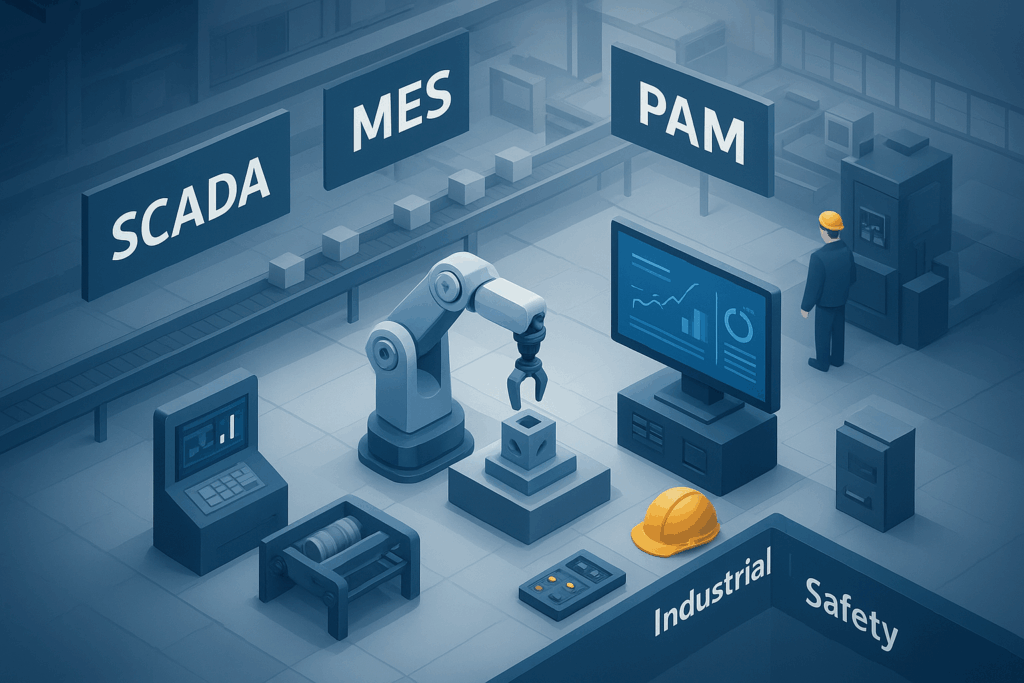The smart factory market is undergoing rapid evolution as industries worldwide adopt advanced digital solutions to optimize operations, improve efficiency, and ensure workplace safety. Solutions such as Supervisory Control and Data Acquisition (SCADA), Manufacturing Execution Systems (MES), Plant Asset Management (PAM), and Industrial Safety systems are at the core of this transformation. Each solution brings unique value, enabling manufacturers to embrace automation, predictive analytics, and Industry 4.0 principles. Together, they provide a holistic approach to achieving smarter, safer, and more efficient industrial operations.

SCADA (Supervisory Control and Data Acquisition)
SCADA systems play a pivotal role in modern smart factories by enabling centralized monitoring and control of complex manufacturing processes. These systems gather real-time data from machines, sensors, and control devices, providing operators with actionable insights. SCADA enhances productivity, minimizes downtime, and helps industries maintain higher levels of automation and precision. Its growing adoption in sectors such as oil and gas, automotive, pharmaceuticals, and food and beverages highlights its importance in the smart factory ecosystem.
● Real-time monitoring and visualization of production processes across multiple locations
● Improved decision-making with accurate data collection and analytics
● Integration with IoT and AI for predictive maintenance and operational efficiency
● Enhanced control of energy consumption, reducing operational costs
● Increased scalability for handling large industrial networks
● Remote access and mobile compatibility enabling flexibility in monitoring and control
● Robust cybersecurity measures to safeguard critical infrastructure
● Support for advanced alarm management systems for quick response to disruptions
● Facilitation of compliance with industrial standards and regulations
● Wide adoption across process industries for enhanced reliability and performance
Manufacturing Execution Systems (MES)
Manufacturing Execution Systems are at the heart of digital transformation in production. MES bridges the gap between enterprise-level systems such as ERP and shop floor operations, ensuring a seamless flow of information. This solution provides visibility into manufacturing activities, enabling better planning, resource utilization, and quality control. By digitizing workflows, MES helps manufacturers reduce waste, improve throughput, and enhance product traceability critical in industries like pharmaceuticals, aerospace, and food production.
● Real-time tracking of production orders and work-in-progress inventory
● Improved scheduling and capacity planning for optimized manufacturing cycles
● Enhanced traceability and genealogy of products for quality and compliance purposes
● Integration with ERP and supply chain systems for streamlined operations
● Reduction of manual errors through automated data entry and process tracking
● Enabling lean manufacturing practices to minimize waste and inefficiencies
● Quality management modules for early defect detection and corrective actions
● Advanced analytics to identify bottlenecks and optimize throughput
● Flexibility to support customized production requirements and shorter product life cycles
● Cloud-enabled MES solutions for scalability and remote accessibility
Plant Asset Management (PAM)
Plant Asset Management solutions are critical for ensuring the longevity and efficiency of equipment within smart factories. By leveraging advanced diagnostics, real-time monitoring, and predictive analytics, PAM solutions optimize the lifecycle management of assets. This leads to reduced downtime, cost savings, and improved return on investment. In a competitive industrial landscape, PAM ensures that organizations can maximize productivity while keeping maintenance costs under control.
● Real-time asset condition monitoring for improved operational reliability
● Predictive maintenance to reduce unplanned downtime and repair costs
● Optimization of spare parts inventory and resource allocation
● Integration with IoT sensors and analytics for proactive asset management
● Extended lifecycle of machinery and reduced capital expenditure
● Data-driven insights for performance benchmarking and decision-making
● Comprehensive reporting tools for regulatory compliance and audits
● Improved workforce productivity through mobile-enabled asset management tools
● Enhanced safety by identifying potential equipment failures early
● Contribution to sustainability goals by minimizing energy waste and asset overuse
Industrial Safety
Industrial safety is a cornerstone of smart factories, ensuring that workers and equipment are protected in high-risk environments. Advanced safety solutions integrate with automation systems to prevent accidents, monitor hazardous areas, and enforce compliance with safety standards. With the rise of Industry 4.0, safety systems are not only reactive but also predictive, powered by IoT, AI, and real-time data analytics. This proactive approach helps manufacturers reduce workplace incidents, maintain productivity, and protect brand reputation.
● Real-time monitoring of environmental conditions such as temperature, gas leaks, and pressure levels
● Integration of safety interlocks and emergency shutdown systems with automation platforms
● Wearable technologies for worker safety monitoring and location tracking
● Compliance management with global and local safety regulations
● AI-driven predictive safety systems to detect potential hazards before accidents occur
● Enhanced fire and gas detection systems integrated with plant control networks
● Training and simulation platforms for workforce safety preparedness
● Video surveillance and machine vision systems to ensure adherence to safety protocols
● Cybersecurity integration to protect safety systems from digital threats
● Significant reduction in workplace injuries and fatalities through proactive safety measures
The smart factory market by solution is fundamentally reshaping the industrial landscape. SCADA brings centralized visibility, MES ensures seamless production control, PAM optimizes asset life, and industrial safety safeguards people and equipment. Together, these solutions enable manufacturers to operate at peak efficiency while maintaining high safety and compliance standards. As Industry 4.0 continues to evolve, the integration of these solutions with AI, IoT, and advanced analytics will drive further innovation and competitiveness. Manufacturers that adopt these technologies will be better positioned to meet the demands of a dynamic global market, achieve operational excellence, and maintain long-term sustainability.
